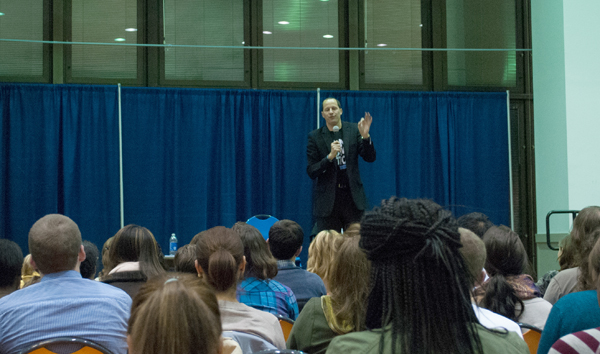
When Mike Domitrz, founder of The Date Safe Project, took the floor of the Student Union Multi-purpose Room on Wednesday, Oct. 17, the room fell silent in preparation for the message he came to deliver about sexual assault and common misconceptions surrounding it.
While studying theater at Loyola University of Chicago in 1989, Domitrz said he found out that his sister had been raped. He said struggling to deal with the aftermath and the effects it had on his family was when he became aware that schools were not discussing the reality that sexual assault derives from a “failure to obtain consent.”
It’s this failure that inspired the “Can I Kiss You?” talk, when Domitrz said he realized people didn’t speak about sexual assault after attending a lecture presented by Joseph Weinberg in 1990 at the University of Wisconsin-Whitewater.
Domitrz said the topic of sexual assault was considered taboo when he first began, and so he approached Weinberg with questions on how to overcome this. Weinberg encouraged his drive to explore the subject further.
It was during his conversation with Weinberg, Domitrz said, that he realized his voice could create a powerful and positive effect on students and the key would be to “open their minds” with laughter.
“People mistakenly assume talking about sexual assault leads to a depressing discussion,” Domitrz said. “However, discussing consent can be an exciting and passionate conversation. My goal is to inspire a new way of thinking.”
When the New Paltz campus became his audience, he opened his discussion with a seemingly harmless question: “Do most people ask first or just go for it?”
Audience members said the common belief is that obtaining consent for something as simple as a kiss is unnecessary.
Anticipating that answer, Domitrz presented the idea that most peoples’ dating practices have developed from standards of disrespect and that body language only provides assumptions, not certainty.
This suggestion, though presented lightheartedly, altered the tone of the room as the attention of the students was captured. Though some shifted uncomfortably in their seats, many of the students responded with surprise and interest.
“It was such a unique way to look at it,” second-year communication major Jessi Langdon said. “It seems like it should be obvious, but no one usually thinks to ask for a kiss instead of just going for it.”
Domitrz said that one of the most romantic and sensual things that someone can do is verbally request to engage in an intimate act instead of just forcing it. Using the movie “The Notebook” as an example, he said hearing the phrase “can I kiss you?” instead of just assuming can have a more “positive and sexier” effect.
“It sounds creepy when you say it, but honestly everybody wants the famous ‘Notebook’ kiss and that’s not what you usually get,” Langdon said.
During the forum, Domitrz also emphasized the importance of communication between parents and their children about sexual decision-making. He said children are taught that parents will “kill whoever touches them,” but never told that their parents will “always be there for them” if something ever happened.
The program, he said, is also designed to help peers and parents understand that it is more efficient to emphasize support rather than pity.
Other students, however, were not convinced by Domitrz’s methods.
Jaydon Kiernan, a third-year biology major, said the program failed to recognize that sexual assault occurs in many different ways.
“It was naively put together,” Kiernan said. “[Domitrz] gave what he thought was a flawless plan in preventing date rape but sexual assault doesn’t occur in just one form.”
Domitrz closed the program by giving away free T-shirt and copies of his two books — “May I Kiss You” and “Voices of Courage” — to members of the audience.
Domitrz exited the stage to applause and laughter with his last words echoing:
“Every survivor is an incredible person. To turn around and continue to live life is something I can’t even begin to imagine.”
Kelsey Damrad

